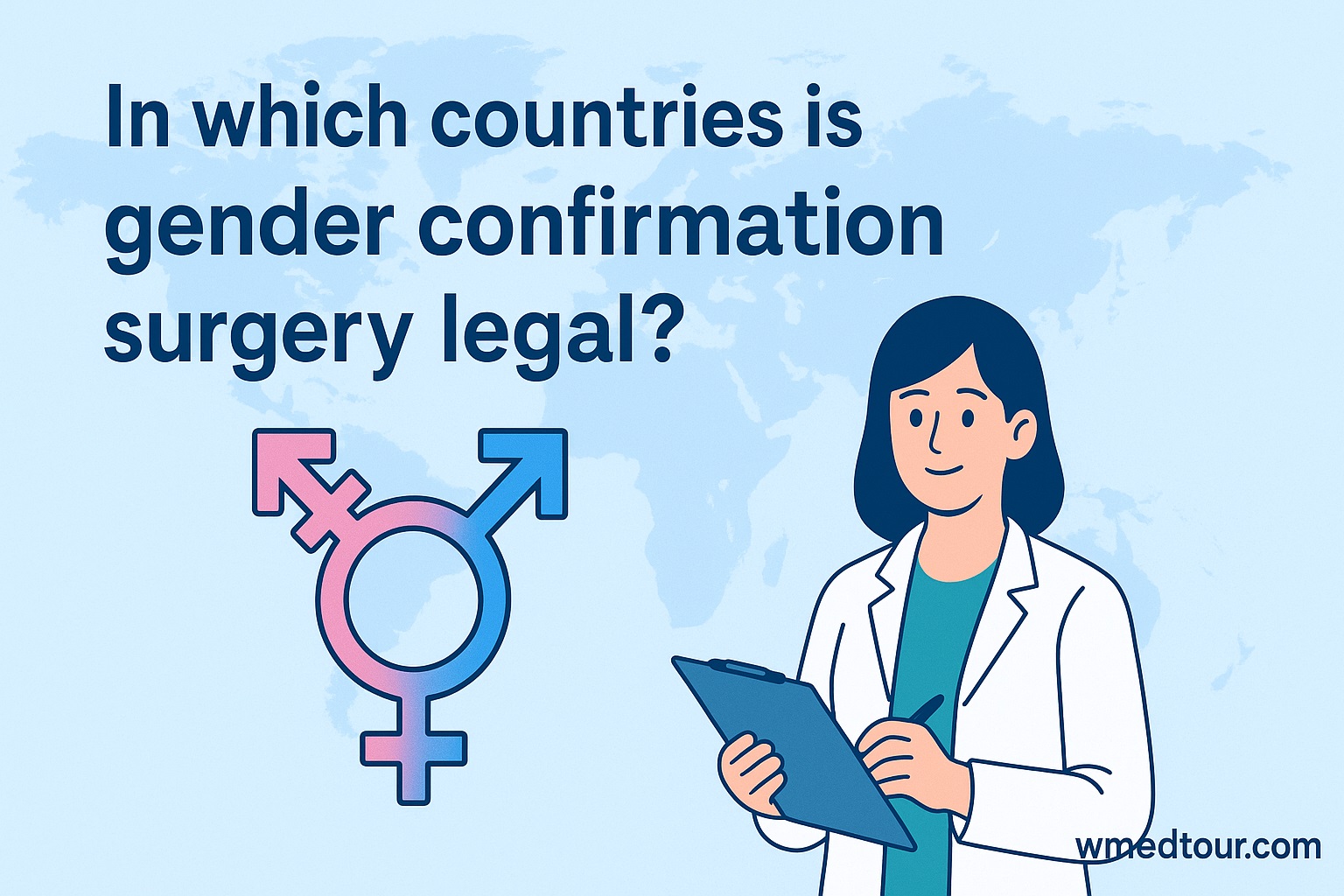Gender Confirmation Surgery Legal Countries: A Global Guide to Access and Regulations
Executive Summary: Key Takeaways on GCS Legality
Navigating the global landscape of transgender healthcare, specifically Gender Confirmation Surgery (GCS) and where it is legal, can feel overwhelming. This guide demystifies the legal and regulatory environments across the globe, offering clarity for individuals, families, and professionals. Key destinations among the Gender Confirmation Surgery Legal Countries include Thailand, renowned for its expertise; Argentina, a trailblazer for progressive, self-determination laws; and Turkey, a popular, cost-effective hub. Crucially, the legality often hinges on specific, country-mandated requirements like psychiatric evaluations, age restrictions, and, in some places, court orders. Understanding these nuances is the first, vital step toward affirming care.
Understanding the Legal Landscape of Transgender Surgery Access
The journey to gender affirmation is deeply personal, yet the path to obtaining essential medical care, particularly Gender Confirmation Surgery (GCS), is heavily dictated by geography and law. Globally, legal acceptance of transgender identities and access to surgical procedures is a patchwork of progressive policies and historical restrictions. While many nations acknowledge the need for gender-affirming care, the bureaucratic and medical hurdles placed before individuals vary dramatically. It’s an evolving area, but one where clarity is paramount for safe and successful treatment.
We’re going to explore the different regulatory environments that define the list of Gender Confirmation Surgery Legal Countries, offering a comprehensive and empathetic overview. We find that the legality often aligns with a country’s broader stance on transgender rights. Countries that embrace self-determination, for example, tend to have fewer surgical prerequisites. Conversely, regions requiring a “real-life experience” period or mandatory psychiatric diagnosis often reflect a more cautious, historically pathologizing legal approach. For anyone considering GCS, understanding these regional legalities is as important as assessing medical expertise. (Read more on global medical treatment regulations).
—
Global Leaders: Top Gender Affirming Surgery Legal Countries 🗺️
A few nations have distinguished themselves as major destinations for those seeking GCS, balancing legal recognition with exceptional medical standards. This is where most individuals successfully access affirming surgical care.
Thailand: The Long-Standing Global Standard for Trans Feminine GCS Legality 👑
For decades, Thailand has been a powerhouse in the field of GCS. Thai surgeons pioneered several techniques, establishing a reputation for expertise, particularly in trans feminine surgeries. The legal framework is clear, typically requiring a psychological assessment and a period of living in the affirmed gender, known as the ‘real-life experience.’
- Pros: Decades of experience, renowned surgeons, comprehensive post-operative care packages, high-quality private facilities.
- Cons: Travel and accommodation costs can add up, and the cultural context, while generally accepting of the procedure itself, differs significantly from Western nations.
Turkey: A Growing Hub for Medical Tourism and GCS Legal Access 🇹🇷
Turkey has rapidly become a significant player in the global medical tourism market, including GCS. The law permits the procedure for adults aged 18 and over, provided they secure a report from a psychiatric and medical board confirming gender dysphoria. This clear, regulated path attracts many patients, particularly from Europe and the Middle East (Yale Journal of Law and Feminism on international gender identity laws).
- Pros: Highly competitive pricing, modern and accredited hospitals, and a convenient location linking East and West.
- Cons: Bureaucratic steps involving multiple board approvals can be lengthy; cultural attitudes outside major cities may be less affirming. (See related article on plastic surgery trends in Turkey).
Argentina: The Progressive Trailblazer in Gender Confirmation Surgery Legal Countries 🇦🇷
Argentina stands out with its incredibly progressive GCS laws. Its 2012 Gender Identity Law allows individuals to change their legal gender and access GCS through the public healthcare system based solely on self-determination, without mandatory judicial or medical sign-off. This makes it one of the most legally accessible nations.
- Pros: Legal simplicity, strong foundation of human rights, no mandatory gatekeeping procedures.
- Cons: Access to expert surgeons and specialized facilities may be more centralized in major cities like Buenos Aires; private care costs can be high.
—
Regional Breakdown: Access to Gender Affirming Surgery Globally 🌎
Europe and North America: Regulations for Transgender Surgery 🇪🇺🇺🇸🇨🇦
Access is generally widespread across Western Europe, the US, and Canada, though regional differences exist. Many countries, including Germany, Spain, and Nordic nations, have moved towards or implemented laws based on self-determination for legal gender recognition, often simplifying the medical pathway. In the US, availability is high, with an increasing number of major medical centers offering specialized gender-affirming care (Harvard Law School on Transgender Rights and Healthcare).
Conversely, some Central and Eastern European nations still maintain more restrictive rules. For instance, some countries may still require sterilization or a divorce for legal gender recognition, though GCS itself is generally legal for adults. This highlights the varying commitment to depathologization across the continent.
Comparison Table: GCS Legal Access & Requirements
| Country/Region | Legal Status | Key Requirement | Expertise Level |
|---|---|---|---|
| Thailand | Legal | Psychological Evaluation, Real-Life Experience (RLE) | Exceptional (Global Gold Standard) |
| Argentina | Legal | Self-Determination (No mandatory medical/judicial approval) | Good (Progressive Legal Model) |
| Turkey | Legal (Ages 18+) | Psychiatric & Medical Board Approval | High (Major Medical Tourism Hub) |
| United States | Legal (State-based) | WPATH Standards, Insurance Approval (Varies by state/insurer) | Very High (Specialized Centers) |
| Iran | Legal (Unique Framework) | Medical Board Evaluation, Court Order (Fatwa-sanctioned) | Good (Specialized, Unique Legal Status) |
Asia and the Middle East: Unique Gender Confirmation Surgery Legal Countries 🇮🇷🇹🇭
The situation in Asia is highly complex. While Thailand and the Philippines have significant acceptance and high volumes of GCS, other major nations like India and China have varying degrees of legal recognition and access. The unique case of Iran, where a religious edict (fatwa) made GCS legal, highlights the disparate legal motivations for allowing the procedure in this region.
Understanding the full scope of Gender Confirmation Surgery Legal Countries often requires a deep dive into local regulatory details (Explore more on global legal regulations for medical travel).
—
Case Study: Elena’s Journey to GCS in Turkey
Elena, a 35-year-old software engineer from a country with restrictive GCS laws, knew she needed to seek care internationally. After extensive research, she considered the options: Thailand for its reputation and expertise, or Turkey for its lower cost and proximity to her home region. She decided on Turkey to undergo her trans feminine Gender Confirmation Surgery.
The Patient Journey
- Initial Assessment: Elena connected with a specialized medical tourism facilitator who helped her secure appointments with an accredited Turkish hospital. She obtained the required psychiatric report confirming gender dysphoria in her home country and had it translated.
- Medical Board Approval: The hospital coordinated the submission to the Turkish medical board, which reviewed her documentation and provided the necessary surgical approval. This stage, she notes, required patience but felt well-regulated. (NCBI on Transgender Health and Law).
- The Procedure: Elena underwent a successful vaginoplasty with an experienced surgeon in Istanbul. The hospital environment was modern and affirming.
- Post-Operative Care: She stayed in Turkey for three weeks for recovery and initial post-operative appointments, utilizing the robust aftercare services provided by the clinic.
- Outcome: Elena returned home affirmed and healthy, having successfully navigated a legal and medical system outside her own, which provided the high-quality, legally recognized GCS she needed. She often recommends thorough pre-travel checklists to others (View our pre-travel checklist for patients).
—
Who is This For? 🎯
This guide is essential reading for several key audiences:
1. Transgender Individuals: Those who are in the planning stages of their surgical transition and are exploring international options due to cost, expertise, or restrictive local laws. Understanding the legal status of Gender Confirmation Surgery Legal Countries helps you strategically plan your medical travel.
2. Healthcare Professionals: Psychiatrists, endocrinologists, and general practitioners who treat transgender patients and need to provide informed referrals or advice on global standards and requirements (e.g., WPATH Standards of Care). (World Professional Association for Transgender Health (WPATH)).
3. Medical Tourism Facilitators: Professionals coordinating international care packages who require up-to-date knowledge on legal prerequisites, safety protocols, and country-specific GCS expertise.
4. Advocates and Researchers: People tracking global trends in transgender rights and healthcare access, particularly concerning surgical affirmation procedures.
—
Pros and Cons of Traveling to SRS Legal Countries
Choosing to travel internationally for GCS is a momentous decision with distinct advantages and challenges that need careful consideration.
Pros of International GCS
- Cost-Effectiveness: In destinations like Turkey and Thailand, the overall cost of the procedure, even including travel and accommodation, can be significantly lower—often 50% to 70% less—than in the United States or Western Europe.
- Expertise and Volume: Countries that have been GCS hubs for decades, such as Thailand, offer surgeons with extremely high procedure volumes and specialized expertise.
- Faster Access: Wait times for GCS in some public healthcare systems (like the UK or Canada) can be years long. International private care offers much quicker access to the life-saving procedure.
- Progressive Legal Frameworks: Countries like Argentina offer legal pathways that minimize bureaucratic gatekeeping, prioritizing the patient’s self-identification. (See related article on transgender surgery legal countries guide 2025).
Cons of International GCS
- Aftercare and Complications: Returning home, follow-up care can be complex, and managing rare post-operative complications remotely can be challenging. (See general recovery timeline concerns, applicable to any surgery).
- Language and Cultural Barriers: While major clinics have translators, communication outside the medical setting can be difficult, and cultural norms may not always align with the patient’s experience.
- Legal Recourse: Should a medical error occur, legal recourse in a foreign country can be complicated and costly, making it crucial to choose only highly accredited facilities. (JSTOR on Medical Malpractice and Tourism).
- Insurance and Financing: Most domestic insurance providers will not cover international procedures, making financing entirely the patient’s responsibility. (Learn about financing complex surgeries).
—
Frequently Asked Questions (FAQ) About GCS Legality and Access
Q1: Is Gender Confirmation Surgery legal worldwide?
A: No. While it is legal in many countries, especially those with advanced healthcare systems and strong civil rights protections, many nations still have restrictive, unclear, or outright non-existent legal frameworks for GCS. This is why knowing the Gender Confirmation Surgery Legal Countries is essential.
Q2: What is the main requirement for GCS in most SRS Legal Countries?
A: The most common requirement, often adhering to the WPATH Standards of Care, is a comprehensive psychological evaluation and diagnosis of gender dysphoria from qualified mental health professionals. Some regions also require a “real-life experience” period.
Q3: Does the legalization of GCS mean a country has strong transgender rights?
A: Not always. Iran, for example, legally permits GCS but has restrictive laws concerning overall LGBTQ+ rights. Conversely, countries like Argentina link GCS access directly to broad, progressive gender identity laws. (Office of the High Commissioner for Human Rights on Transgender Law).
Q4: Which countries allow GCS without psychiatric approval?
A: Argentina is the most prominent example where the legal path is based on self-determination, though private facilities may still require psychological evaluations for surgical clearance.
Q5: Is GCS covered by national health insurance in any country?
A: Yes. Many developed nations in Europe (e.g., the UK’s NHS, though wait times are long) and some regions of Canada and the US (through various state-based Medicaid or private plans) offer coverage, but the specifics and extent of coverage vary widely. (Germany’s health coverage details).
Q6: Are there age restrictions for Transgender Surgery?
A: Yes. The vast majority of countries, including all major GCS destinations, set the minimum age at 18. Some European countries, however, have different age limits for hormone therapy versus surgery (University of Texas Law on Transgender Health).
Q7: Can a minor receive GCS with parental consent?
A: In almost all jurisdictions, major surgical interventions like GCS are exclusively for adults (18+), even with parental consent. However, puberty blockers and hormone therapy for minors are increasingly accessible with parental and medical approval in many Western countries. (See related article on pediatric care).
Q8: What is “Real-Life Experience” (RLE) in the context of GCS?
A: RLE is a historical requirement, still used in some regions, where an individual must live publicly in their affirmed gender role for a specified period (e.g., 6 months to a year) before being approved for surgery. (Medical advances often challenge traditional requirements).
Q9: How do I verify a foreign clinic’s credentials?
A: Look for international accreditations like JCI (Joint Commission International), check surgeon credentials against recognized international boards, and seek out verified patient reviews. Never use non-accredited facilities or competitor clinics (Tips on choosing the safest medical travel destination).
Q10: Is it true that Iran is a major GCS destination?
A: Yes. While controversial given its overall legal environment for LGBTQ+ people, Iran legally permits and regulates GCS following a religious edict. This makes it a significant, regulated destination for this specific procedure. (Legal guide for medical travel to Iran).
Q11: What are the risks of traveling for GCS?
A: The risks include logistical stress, potential language barriers, difficulty securing follow-up care, and the stress of a long recovery in a foreign country. Careful planning mitigates these risks. (Refer to global medical tourism guide 2025).
Q12: Where can I find reputable surgeons for GCS?
A: Reputable surgeons are typically found in major, internationally accredited university-affiliated hospitals or high-volume surgical centers in destinations like Thailand, Turkey, and the United States. Always prioritize a surgeon’s specialty training and experience in GCS. (Search for expert doctors).
Disclaimer: The legal status of Gender Confirmation Surgery Legal Countries is constantly changing. Individuals must always verify current local laws, age restrictions, and specific medical requirements with the consulate of the destination country and their chosen medical team before making travel plans. This information is for general guidance only.
Planning other procedures? Check out: Plastic Surgery Department | Gynecological Surgery | Urological Surgery | All Locations | FAQ | Contact Us | Articles | Dental | Skin and Hair | Oncology | Checkup




